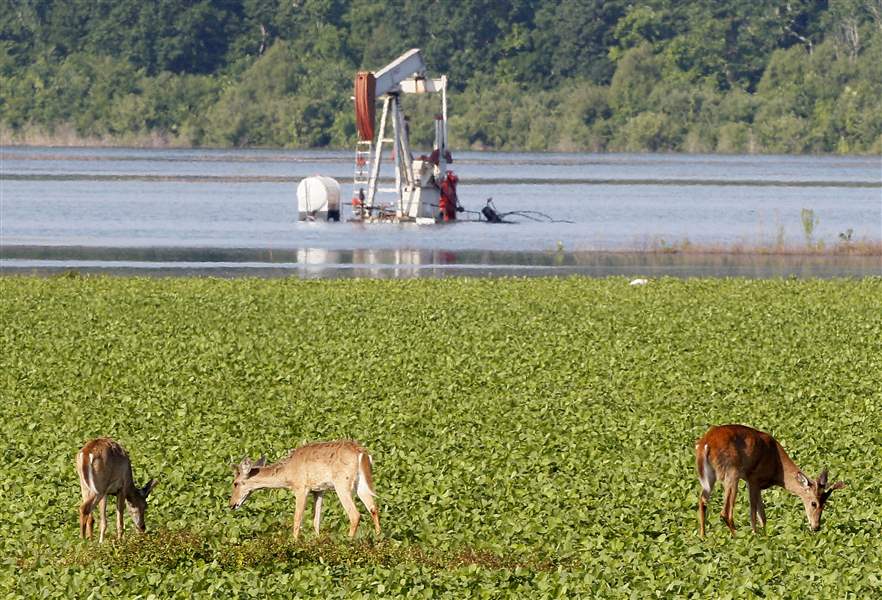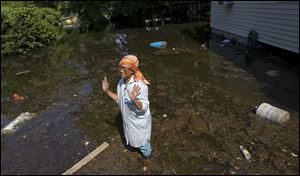
Those displaced by Mississippi worry, wait for river to recede
5/18/2011
Deer feed in front of an oil derrick in Concordia Parish, Louisiana, where residents have been warned to be mindful of wildlife pushed out of their habitats by the floods.
Associated press

Judith Stampley, 71, stands in water in what should be the front yard of her Vicksburg, Miss., home.
VICKSBURG, Miss. -- For thousands of people forced from their homes by the rising Mississippi River, life has become a tedious waiting game: waiting for meals at shelters, waiting for the latest word on their flooded homes, waiting for the river to fall.
The monotony of shelter life has taken a toll on victims who have been displaced for weeks and may not be able to return for at least a month. The river is expected to crest Thursday in Vicksburg, but high water might not retreat in some areas until late June.
"Lord only knows when it's going to recede. It's so much water," said Steven Cole, who has stayed for nearly two weeks at a church being used as a Red Cross shelter.
Mr. Cole's bottom lip quivered as he described how he ended up here: He wrecked the truck he uses for carpentry work while helping evacuate several families. Then the house he shared with a friend flooded.
Without the shelter in Vicksburg, "I'd be out in the streets," he said.
Nearby, farmers received a bit of good news when officials said they did not expect water to spill over the top of a closely watched levee protecting thousands of acres of crops. And cargo was moving slowly along the Mississippi after the Coast Guard reopened a key segment of the river north of New Orleans late Tuesday.
But those developments did nothing to help people whose homes are underwater. And they have little to fill their days except worry and boredom.

Deer feed in front of an oil derrick in Concordia Parish, Louisiana, where residents have been warned to be mindful of wildlife pushed out of their habitats by the floods.
At shelters, evacuees pass the time reading, praying, or smoking cigarettes.
Vivian Taylor-Wells, a retired nurse and substitute teacher, swaps stories with the other evacuees and thinks a lot about the future. There's not much else to do.
"I pray. I read. I meditate," she said. "I just try to sit calm and get my bearings."
Her car broke down while she was evacuating, so she had to leave behind many belongings at her house, which was swamped with several feet of water.
"I can't say what the losses are going to be, but it's going to be big," she said.
More than 4,800 people have been displaced by flooding in Mississippi, more than 2,000 of them in Vicksburg and surrounding areas. By the time the flooding ends, more than 6,000 people in Mississippi could be forced to leave their homes, according to the Mississippi Emergency Management Agency.
Even those who haven't evacuated are in a wait-and-see mode. In Eagle Lake, Miss., the whole town gathers every night at Strick's, the only business still open in town.
The whole town is 15 people, and Strick's is a bar that occupies a low metal building, as impressive as a storage shed.
While the population of Eagle Lake normally numbers in the hundreds, these few, these happy few, are all that remain. They are the holdouts after a townwide exodus, prompted by concerns over the fat and ferocious Mississippi River, which runs just on the other side of the lake.
Every night they sit in this mostly empty bar, throwing back some beers and eating a communal dinner of hamburgers or crawfish or whatever was brought in by the last person to visit a grocery store.
They tell stories, watch television, and talk about any number of things, but usually about the latest measurements of the river, the state of the levees on which they depend for survival, and their disappointment in the less hardy souls who took off at the first hint of danger.
"A bunch of people are real sorry they left," said Tim Stennett, 52, a building contractor who took over the bar when "Strick" himself -- Mike Strickland -- handed off the keys.
Mr. Stennett's wife, Sheryl, became the bartender, although the Stennetts leave the keys with anyone who wants to drink late. Drinks are paid for on the honor system.
Eagle Lake is 35 miles from Vicksburg, but flood-related road closings have stretched that to 140 miles.
Elsewhere, accommodations for evacuees range from shelters lined with cots to parking lots where people gathered in campers.
People staying in the lot outside the Tunica Arena and Exposition Center have been given until June 10 to find somewhere else to live.
By the time the deadline arrives, federal money could be available to help pay evacuees' expenses, including the cost of hotel rooms, Tunica County Supervisor James Dunn said.
Some of the worst flooding in the state is in the area from Vicksburg northeast to Yazoo City, along the Yazoo River. At the Yazoo Backwater Levee north of Vicksburg, worried officials had been watching water slowly climb up the berm.
Early predictions had been that at least a foot of water could pour over the top, flooding tens of thousands of acres of farmland.
But Wednesday the Army Corps of Engineers said it did not expect the water to overflow the levee.
Forecasters also lowered their expectation for the river's crest at Vicksburg, estimating a height of 57.1 feet Thursday, down a few inches from recent predictions.
The crest downstream at Natchez was predicted to happen Saturday.
River levels in Baton Rouge and New Orleans were expected to hold steady near flood stage for the next 2 1/2 weeks.
Among those keeping a close eye on the levee was Ed Jordan. About a third of his farm is underwater, and the rest is parched. He's agonizing over whether to water crops that could still get flooded.
"We're having a flood and a drought at the same time," he said.